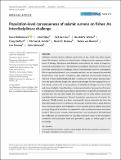Files in this item
Population-level consequences of seismic surveys on fishes : an interdisciplinary challenge
Item metadata
| dc.contributor.author | Slabbekoorn, Hans | |
| dc.contributor.author | Dalen, John | |
| dc.contributor.author | de Haan, Dick | |
| dc.contributor.author | Winter, Hendrik V. | |
| dc.contributor.author | Radford, Craig | |
| dc.contributor.author | Ainslie, Michael A. | |
| dc.contributor.author | Heaney, Kevin D. | |
| dc.contributor.author | van Kooten, Tobias | |
| dc.contributor.author | Thomas, Len | |
| dc.contributor.author | Harwood, John | |
| dc.date.accessioned | 2019-05-07T14:30:01Z | |
| dc.date.available | 2019-05-07T14:30:01Z | |
| dc.date.issued | 2019-07 | |
| dc.identifier | 258866371 | |
| dc.identifier | aa5e0556-2656-48fb-a832-a1f920f3d650 | |
| dc.identifier | 85065426176 | |
| dc.identifier | 000474606100004 | |
| dc.identifier.citation | Slabbekoorn , H , Dalen , J , de Haan , D , Winter , H V , Radford , C , Ainslie , M A , Heaney , K D , van Kooten , T , Thomas , L & Harwood , J 2019 , ' Population-level consequences of seismic surveys on fishes : an interdisciplinary challenge ' , Fish and Fisheries , vol. 20 , no. 4 , pp. 653-685 . https://doi.org/10.1111/faf.12367 | en |
| dc.identifier.issn | 1467-2960 | |
| dc.identifier.other | RIS: urn:2F262BF54B464BBC7757B656BD1B2388 | |
| dc.identifier.other | ORCID: /0000-0002-7436-067X/work/57330725 | |
| dc.identifier.uri | https://hdl.handle.net/10023/17655 | |
| dc.description.abstract | Offshore activities elevate ambient sound levels at sea, which may affect marine fauna. We reviewed the literature about impact of airgun acoustic exposure on fish in terms of damage, disturbance and detection and explored the nature of impact assessment at population level. We provided a conceptual framework for how to address this interdisciplinary challenge, and we listed potential tools for investigation. We focused on limitations in data currently available, and we stressed the potential benefits from cross‐species comparisons. Well‐replicated and controlled studies do not exist for hearing thresholds and dose–response curves for airgun acoustic exposure. We especially lack insight into behavioural changes for free‐ranging fish to actual seismic surveys and on lasting effects of behavioural changes in terms of time and energy budgets, missed feeding or mating opportunities, decreased performance in predator‐prey interactions, and chronic stress effects on growth, development and reproduction. We also lack insight into whether any of these effects could have population‐level consequences. General “population consequences of acoustic disturbance” (PCAD) models have been developed for marine mammals, but there has been little progress so far in other taxa. The acoustic world of fishes is quite different from human perception and imagination as fish perceive particle motion and sound pressure. Progress is therefore also required in understanding the nature and extent to which fishes extract acoustic information from their environment. We addressed the challenges and opportunities for upscaling individual impact to the population, community and ecosystem level and provided a guide to critical gaps in our knowledge. | |
| dc.format.extent | 33 | |
| dc.format.extent | 1817934 | |
| dc.language.iso | eng | |
| dc.relation.ispartof | Fish and Fisheries | en |
| dc.subject | Airgun | en |
| dc.subject | Behavioural response | en |
| dc.subject | Dynamic energy budget | en |
| dc.subject | Fish hearing | en |
| dc.subject | Population consequences of acoustic disturbance | en |
| dc.subject | Stress physiology | en |
| dc.subject | SH Aquaculture. Fisheries. Angling | en |
| dc.subject | QH301 Biology | en |
| dc.subject | T-NDAS | en |
| dc.subject | SDG 14 - Life Below Water | en |
| dc.subject.lcc | SH | en |
| dc.subject.lcc | QH301 | en |
| dc.title | Population-level consequences of seismic surveys on fishes : an interdisciplinary challenge | en |
| dc.type | Journal article | en |
| dc.contributor.institution | University of St Andrews. Statistics | en |
| dc.contributor.institution | University of St Andrews. School of Mathematics and Statistics | en |
| dc.contributor.institution | University of St Andrews. Marine Alliance for Science & Technology Scotland | en |
| dc.contributor.institution | University of St Andrews. Centre for Research into Ecological & Environmental Modelling | en |
| dc.contributor.institution | University of St Andrews. School of Biology | en |
| dc.contributor.institution | University of St Andrews. Scottish Oceans Institute | en |
| dc.contributor.institution | University of St Andrews. St Andrews Sustainability Institute | en |
| dc.identifier.doi | 10.1111/faf.12367 | |
| dc.description.status | Peer reviewed | en |
This item appears in the following Collection(s)
Items in the St Andrews Research Repository are protected by copyright, with all rights reserved, unless otherwise indicated.

